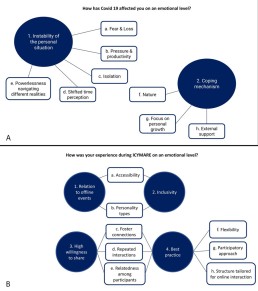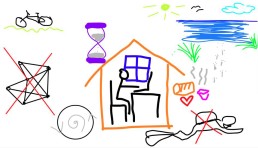ICYMARE 2020 Online Networking Event
Tailored equipment solutions to Early Career Marine Researchers
In the context of the Covid-19 pandemic science and researchers were highly affected. In this context, as organizers of a scientific conference for Early Career Researchers (ECRs) we asked ourselves how were ECRs affected by Covid 19 at a personal and professional level, what was the role of online scientific conferences and how could they be better designed? To figure it out we performed some research!
And here is what we learned using a social network analysis, a rich picture session and focus group discussion at the ICYMARE 2020 online networking event,:
- When designed appropriately, online events can serve as important networking opportunities that can be more inclusive, as they do not require travel efforts.
- Online events provide a different set of opportunities and can be important especially where in-person meetings are not possible or restricted.
- Online conferences can strengthen the network of ECRs.
Want to know more and how? Continue reading …
In 2020 ICYMARE, as many other professional and personal institutions, faced travel and contact restrictions due to the Covid-19 pandemic. We experienced that as specifically challenging because the marine environment is globally connected across borders, marine research depends on international cooperation for data collection and (scientific) innovation, and productivity on frequent interdisciplinary and intercultural exchange. Opportunities to connect and exchange latest results are crucial for successful research, career development and building community. Especially early career researchers (ECR) and researchers from marginalized backgrounds are in need of these opportunities (Davis & Warfield, 2011). Losing the chance to meet personally we became concerned about the ICYMARE family.
By moving online in 2020 ICYMARE turned into a completely different format. In contrast to many other conferences, ICYMARE opted to have rather small groups, short sessions and presentations, providing much time for personal discussion and an additional channel to chat and foster personal communication and exchange. We used ‘Slack’ as a messaging tool to connect people throughout the conference and beyond.
In the context of Covid-19 related restrictions we decided to take the online format as an opportunity to explore a number of questions about the ICYMARE community that we’ve been wondering about.
We asked ourselves
- How do Covid-19 restrictions influence the working situation and personal well-being of us, as early career researchers (ECRs)?
- Can online conferences help us ECRs to cope with the Covid-19 situation?
- Can we really connect, grow the ICYMARE family and be inspired via an online event?
- What is the networking potential of scientific online conferences for (early) career development within marine research?
- How should an online conference be designed to best meet the needs of (marine) ECRs?
To answer our questions, we conducted a workshop during the conference as well as an online survey before and after the ICYMARE 2020 online networking event. We had 69 respondents before the conference and 34 after the event. Thanks to all who took the time and answered our long and demanding questionnaire and made this research possible!
Ten respondents consistently completed our surveys meaning we could directly compare their network before and after the conference. We followed the network development of these ten participants (Fig. 1) and compared their contacts via a social network analysis.
Our workshop “Beyond professional: Exploring the emotional impacts of COVID-19 in Academia” created space to explore our individual Covid-19 experiences in a fun way. We organized a rich picture session (literally drawing a picture exploring a question or topic together in a group) and a focus group discussion. We recorded and transcribed the workshop and analyzed the data using thematic analysis and the constant comparative method (Creswell, 2004).
If there is another entry on the webpage describing the ICYMARE 2020 online networking event this could be shortened (deleted) and simply linked to the respective part of the webpage.
Fig.1.: Main Cluster (excluding isolates) of the ICYMARE 2020 online networking events participant network before (A,D) and after (B,E) the event and indicating future perspectives (C,F) for the contact, based on questionnaire responses of 10 participants (7,86,8,40,39,18,23,33,55,67). Icon size represents degree centrality (max. degree 36), color indicates career stage (A-C)/ affiliation country (D-F). Visualization made with Gephi (Bastia et al. 2009).
Overall the network of the ten observed participants became less clustered and more interconnected through ICYMARE. Participants from the network’s periphery become more central meaning they made a number of new connections e.g. participant 8, a master student, that was only connected to the main cluster through an indirect connection with participant 52 before the event. 48.87 % of the reported participants at the ICYMARE 2020 online networking event are master students and doctoral candidates. This is great as it is totally our main area of expertise and was our intention: from young marine researchers for young marine researchers ;D . But also the individuals of the ICYMARE family that are on other steps of their career are well included in the network. For example participant 23, a Bachelor student, more than doubled the number of contacts from 5 to 12 connections and plans to maintain them in the future. This participant therefore laid a valuable basis for their future career.
Through the rich picture session we found how vulnerable ECRs were to numerous impacts of Covid-19 due to the ‘Instability of their personal situation’ meaning often uncertainty about where they were working or living (Fig 2A and Fig. 3). However, there were a lot of ‘coping mechanisms’ that people used to deal with the arising challenges and that they shared during the session. The key themes from the focus group discussion (Fig. 2B) highlighted the ‘relation to offline events’ and potential for how to improve the ‘inclusivity’ of online conferences.

Fig. 2.: Guiding question (centered at the top), key themes (dark blue) and the sub-themes (white) emerging from A) a rich picture session and B) a focus group discussion at the ICYMARE 2020 online networking event
Fig. 3.: Rich Picture, following the questions “How has Covid 19 affected you on an emotional level?”, “What were the key challenges?” and “What helped you to cope?”, produced by one of the breakout groups during the ICYMARE 2020 online networking event

Even though we still like to get to know you in 3D and meet you personally each year (Come and join us!;D), after this study we have the impression that online events can really support us, expand our tool box and complement our in-person meetings. They are not a substitute, but a different kind of event and opportunity to connect and build community.
Thanks to your help :
The surveys and the workshop helped us to understand how Covid-19 has negatively affected our working situation and emotional well-being. Feelings of fear, anxiety, uncertainty, overwhelming, isolation, and loss while remaining under high pressure to be productive were reported. Our often highly unstable personal situation being stuck in a foreign country, new working situations or recently graduated with uncertain prospects exacerbated those feelings in many cases.
Introverts can strongly benefit from virtual networking opportunities, while extroverted participants distinctly prefer offline meetings to obtain a feeling of deeper connection.
Although making meaningful connections was traditionally thought not to be possible via online meetings (Oester et al., 2017), our exchange with other ECRs in similar situations at ICYMARE 2020 helped cope with the uncertainty and emotional difficulties in the Covid-19 situation by creating feelings of connection. Repeated interaction with others and high relatedness was an important element that also contributed to a perceived ‘ICYMARE family feeling’ by connecting participants from previous ICYMARE events. This sense of recognition and community helped address feelings of isolation by creating a sense of belonging to the ICYMARE network. Online events provide a different set of opportunities and can be important especially where in-person meetings are not possible or restricted. Therefore they can indeed help to support the emotional wellbeing of ECRs.
The number of connected participants and links increased during the online conference. More than two third of the present connections at the end of the conference have a future perspective. Therefore online conferences with an appropriate design can facilitate scientific exchange and collaboration.
Due to small groups, sensitive moderation by early-career hosts, individual presentation slots, and the chat-function via Slack. When moving a conference online one might not aim to simply transfer the offline format to the virtual space but adapt the concept of sessions, plenaries, breaks etc. in terms of length and group size. Furthermore we got the impression that in an online format it is not necessary to have several continuous full conference days. Therefore we created the ‘ICYMARE Online Forum’. This is a new monthly meeting of the ICYMARE family with a changing topical focus that is open to everybody. Have a look here!
In light of growing concern about the sustainability, accessibility, and inclusion of scientific conferences held in the global North (Neugebauer et al., 2020; Parsons, 2015), ICYMARE 2020 also demonstrated a higher accessibility for participants regarding traveling, time and costs. Even though there were fewer participants than during the ICYMARE 2019 BREMEN event, the composition was more international during the virtual conference. So we conclude, when designed appropriately, online events can serve as important networking opportunities that are more inclusive.
or aim to mimic in-person events, but instead be approached from a different perspective, as a fundamentally different type of event.
Authors
This project was conducted by Theresa Schwenke, Julia Jung and Julieta Vigliano. Coming together under the sudden rise of Covid-19 and bringing our different skills and ideas together, this was our way of putting the ICYMARE family feeling into action. Stuck in our own uncertain and difficult situations, being able to conduct this study and create meaningful insights helped us gain a sense of agency and hope. If you’re interested in seeing a more academic overview of our study, check out the poster we presented at the American Geophysical Union 2020 Fall Meeting

